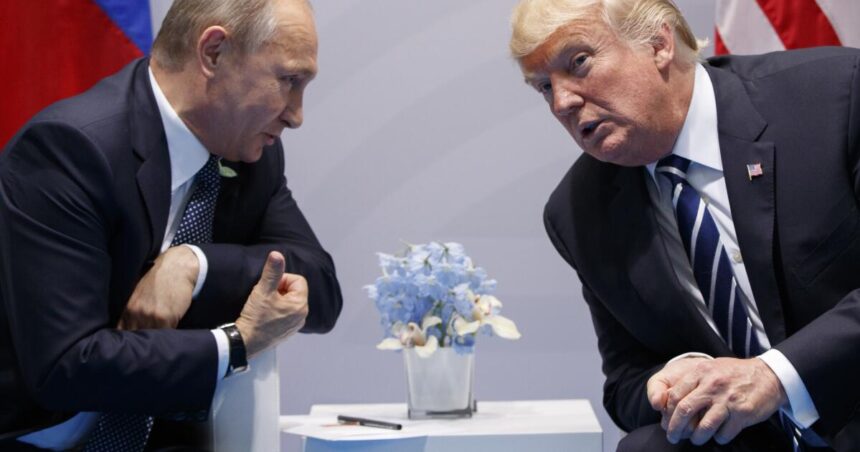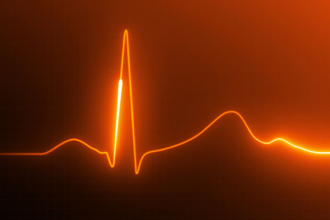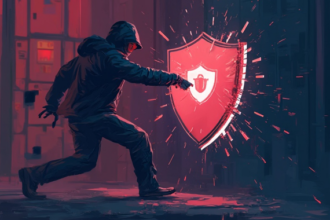Donald Trump is once again talking about his candidacy as if there is no presidency for us to refer to.
The topic this time is the construction of Nord Stream 2, a controversial gas pipeline linking Russia and Germany. Lawmakers from both parties have long opposed Nord Stream 2, fearing it would increase Europe’s energy reliance on Russia. President Trump has called the pipeline “a tool used by Russia to support its continuing aggression against Ukraine,” according to the State Department.
Both President Biden and President Trump have used the decision to criticize Vice President Kamala Harris.
It is true that Biden lifted the sanctions in part to repair the US-German relationship that was strained under the Trump administration. But Biden also lifted the sanctions because the pipeline was 90% complete when he took office. Trump campaigned on claims that he blocked the pipeline’s construction, but the truth is that most of the pipeline was built while Trump was in the White House. Moreover, despite his imposition of sanctions in 2019, the pipeline construction resumed in 2020. And Biden…
The real question is not why Biden lifted sanctions in 2021, but rather why Trump waited until the end of 2019 to act.
The answer lies in our investigation into interference in the 2016 election.
In December 2013, the Trump Organization signed a branding deal for a Moscow residential property that was expected to net Trump about $20 million.
In February 2014, Russia invaded Ukraine and annexed Crimea.
In March, the US, along with its allies, responded with crippling economic sanctions, causing Russia’s economy to plummet and destroying President Trump’s 2013 deal.
But the Russian aggression added to a growing list of criticisms of the foreign policy decisions of President Obama and even Secretary of State Hillary Clinton. As the 2015 primary season progressed, the attacks became part of Republican debates.
When asked during the fourth episode in November of that year, “What would ‘President Trump’ do about Russian aggression?” Trump responded: “First of all, it’s not just about Russia.”
He then mentioned North Korea, Iran and China.
When Trump finally mentioned Russian President Vladimir Putin by name, he first spoke about their time together backstage at “60 Minutes” and then voiced his support for expanding Russian influence in the Middle East.
On the campaign trail today, Trump takes a tough stance against Russia. But as a private citizen, he was trying to do business in Moscow even after Putin invaded Ukraine. And in a 2015 debate, Trump didn’t condemn Putin’s actions in Ukraine, probably because he’d signed a new real estate deal for a Moscow tower the week before.
In fact, he signed his letter of intent on the day of the third Republican debate. He didn’t speak for even six minutes onstage that night, but his lack of courage toward Russia didn’t end there.
In July 2018, while still president, Trump stood next to Putin in Helsinki and refused to confront him about meddling in the 2016 election. Instead, Trump sided with Putin and questioned U.S. intelligence. Then later that year, Russia fired weapons into Ukraine. Most notably, it was the first time that Putin’s regime had fired weapons into Ukraine. The incident sent shock waves around the world, with leaders quickly condemning Putin’s act of aggression on social media.
But Trump was not among them.
More than a full day passed before the leader of the free world spoke to reporters to express his displeasure with Putin’s aggressiveness.
President Obama underestimated Putin in 2012, when he called Russia the country’s biggest geopolitical foe during a debate with Republican candidate Mitt Romney. Obama mocked him, saying, “Two decades after the end of the Cold War, we’re looking for a foreign policy renaissance reminiscent of the 1980s.”
Perhaps for America, that was true.
But for Putin, the war was never over, and Romney knew that.
Concerns about Russia’s influence on European energy were already recognized in 2006 when Ukraine had a pro-Western president. Putin quadrupled Ukraine’s natural gas prices. When Ukraine rebelled, Putin cut off gas supplies to Ukraine in the middle of winter. At the time, pipelines through Ukraine carried about 80% of Russian gas to Europe. So when Putin cut off gas supplies on the morning of Orthodox Christmas in 2009, also in anger at Ukraine, more than 10 European countries were affected.
Trump cannot be allowed to rewrite this crucial moment in history, as the consequences would be dire.
Yes, Russia annexed Crimea under Obama. Yes, Russia invaded Ukraine under Biden. But it was under Trump that Russia fired the first shot in this war, and Trump said, “Hopefully, this will work itself out.” The risks to our national security that such wishful thinking poses cannot be overstated.
If Ukraine falls, Putin would control about one-third of the world’s wheat production and more than 60% of the sunflower oil used in countless food products. The Middle East and Africa are heavily dependent on Ukraine for grain. Do we really think that Putin, who has a history of turning off the gas to punish democracies, would hesitate to weaponize food security?
The idea that candidate Trump would then take a tough stance against Putin is laughable. Trump had his chance and it was clear how weak he was.









